Key takeaways:
- Community events strengthen social ties and foster innovation by gathering diverse individuals for shared experiences.
- Hosting events promotes personal connections and engagement, allowing communities to brainstorm solutions and share valuable insights.
- Successful events require clear communication, inclusivity, and follow-up to enhance relationships and participation.
- Feedback and adaptability are crucial for event organizers to ensure participant involvement and to create memorable experiences.
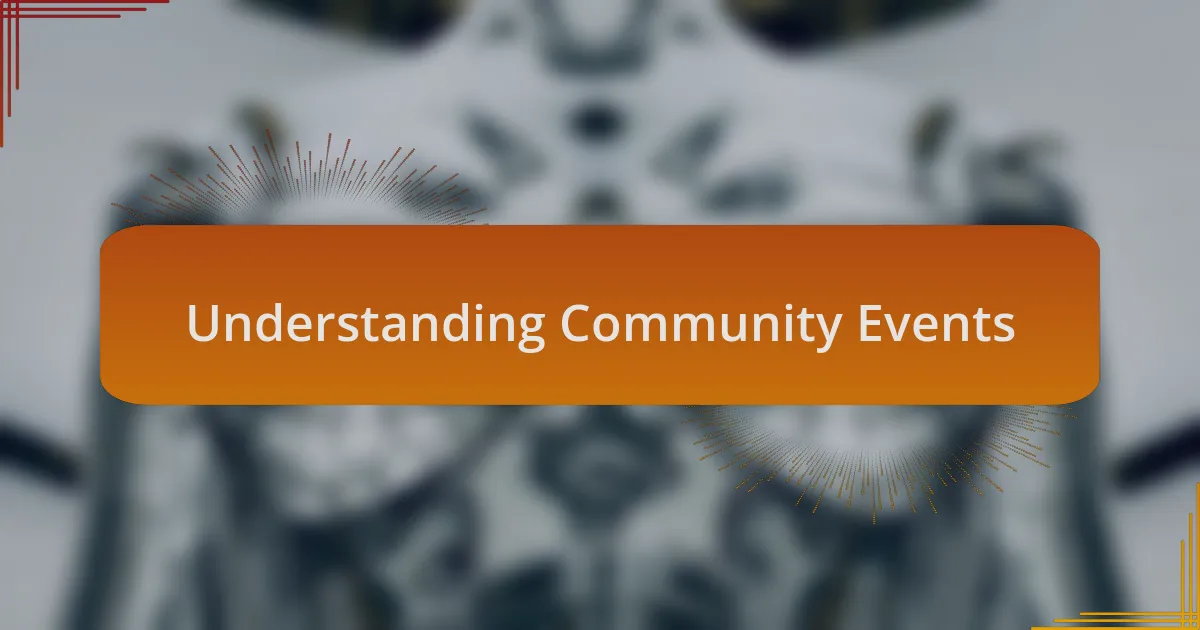
Understanding Community Events
Community events are vibrant gatherings that foster connections among individuals, igniting conversations and collaborations that can lead to meaningful change. I recall hosting a local clean-up day where people from various backgrounds came together, sharing laughs and stories while working towards a common goal. It made me wonder: what drives people to participate in such events? For many, it’s the desire to feel part of something bigger than themselves, leading to a sense of belonging that can be both uplifting and transformative.
Understanding the essence of community events involves recognizing their dual role as platforms for both fun and engagement. Attending one of my first community festivals, I felt an overwhelming sense of joy when I saw families and friends bonding over food, music, and shared experiences. This joy sparked a realization in me: could the simple act of gathering truly have the power to strengthen social ties and foster innovation? Absolutely. These moments serve as a reminder that innovation often begins at the grassroots level, where passion and creativity collide.
Finally, community events serve as a mirror reflecting the values and needs of the people they bring together. I can’t help but reflect on the impact of an art show I organized, showcasing local artists and their stories. Witnessing the pride on their faces as attendees engaged with their work highlighted a key insight: when communities support one another, everyone thrives. It’s both humbling and inspiring to see how shared experiences can build a foundation for lasting social change.
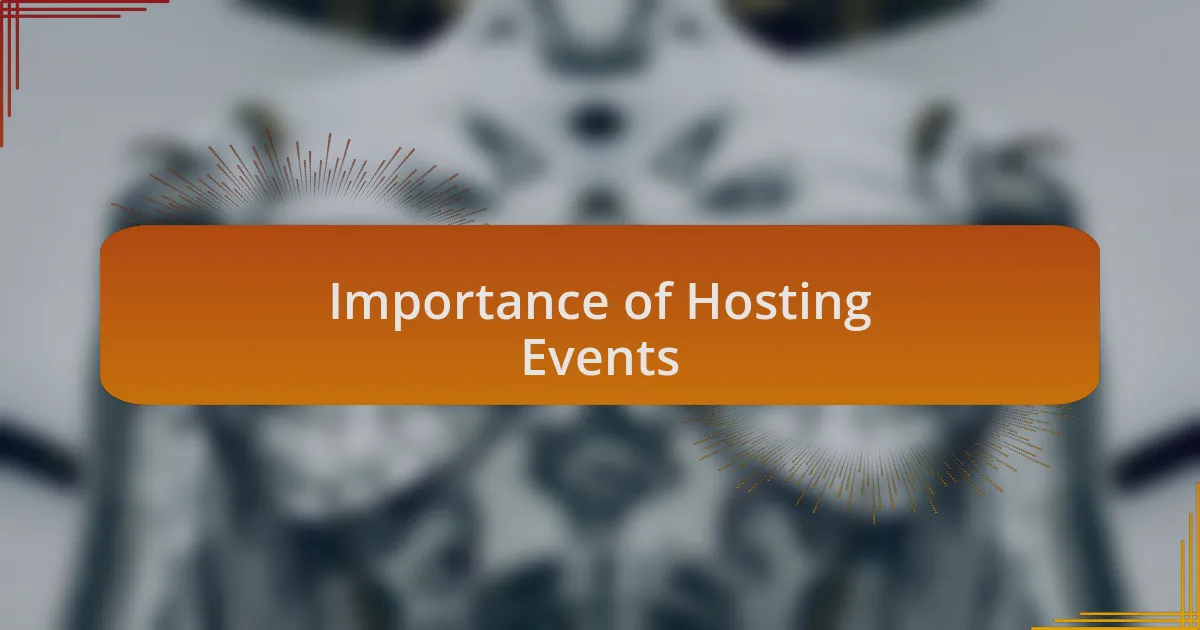
Importance of Hosting Events
Hosting events is crucial for creating opportunities that facilitate personal connections and community bonding. I still remember organizing a neighborhood potluck where, surprisingly, strangers became friends over shared recipes and laughter. This experience made me realize that when we gather, it allows individuals to step out of their routines and engage deeply with one another, fostering a sense of trust and camaraderie.
Moreover, events can act as a catalyst for social innovation. During a workshop I facilitated, participants brainstormed solutions to local issues, sharing unique perspectives that sparked creative ideas. It made me ask: isn’t it incredible how diverse voices can lead to more effective solutions? By bringing people together, events can unlock potential within communities that might otherwise go unnoticed.
Lastly, hosting events allows for the dissemination of important information in an engaging way. I recall a community forum I organized where local leaders shared their insights on sustainable practices. Attendees didn’t just listen; they asked questions, shared their thoughts, and left feeling empowered to make a difference. This interaction emphasized for me that events can serve as a dynamic platform for education, inspiring action and change at every level.

Benefits of Community Engagement
When I think about community engagement, one of its significant benefits is the opportunity for collaboration. For instance, while running a series of neighborhood clean-up days, I witnessed firsthand how teamwork can transform public spaces. Neighbors, armed with trash bags and enthusiasm, bonded over a shared goal, which not only beautified our environment but also forged lasting friendships. Isn’t it amazing how collective action can create a ripple effect beyond the immediate task at hand?
Engagement also nurtures a sense of belonging. I remember attending a community art show where local artists showcased their talents. The atmosphere was electric as attendees mingled and discussed the stories behind each piece. This connection instilled pride in local culture and encouraged others to express themselves creatively. Have you ever felt that rush of belonging when surrounded by people who share your interests?
Furthermore, actively engaging with the community fosters resilience. After organizing a town hall meeting on local challenges, I was astounded by the number of solutions proposed by residents. It struck me that when people feel invested in their community, they become more resilient in facing obstacles. How often do we overlook the strength that lies within our own neighborhoods? By actively engaging, we can harness that strength, turning challenges into opportunities for growth.
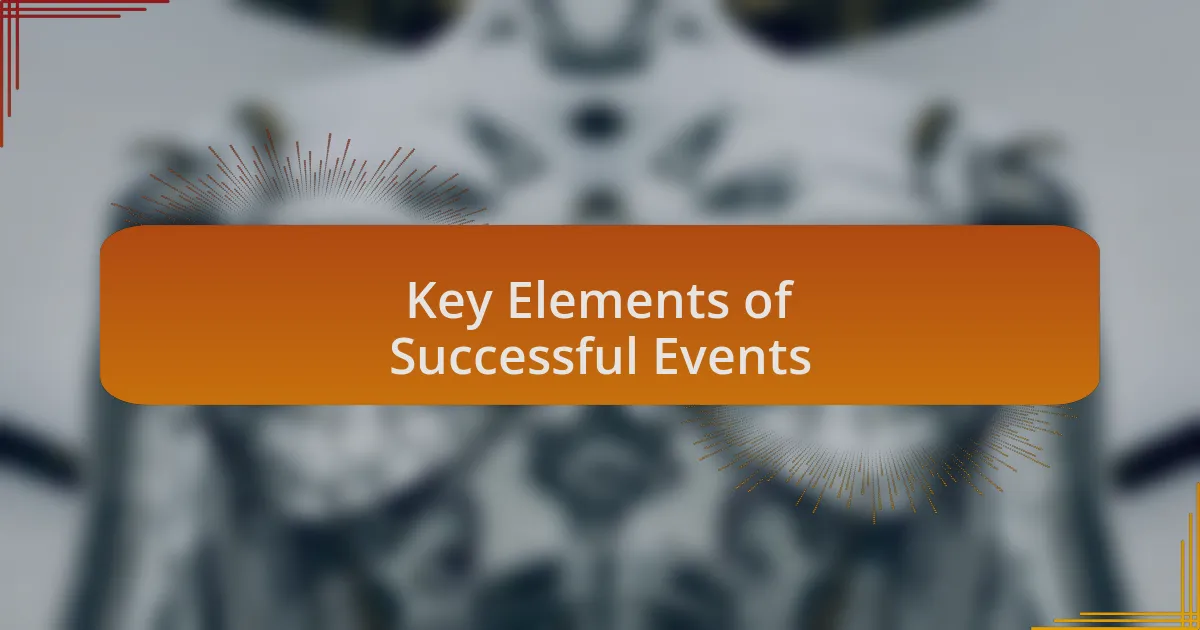
Key Elements of Successful Events
When I think about hosting successful community events, one key element stands out: clear communication. I recall organizing a potluck dinner where confusion about the menu led to overlapping dishes. Imagine the room—everyone arrived with their favorite casserole only to realize we had three of the same! Setting clear expectations and communicating them effectively not only enhances participation but also prevents those hilarious mix-ups that can lead to unexpected conversations.
Another crucial aspect is creating an inclusive atmosphere. I remember a community festival where we ensured various activities catered to different age groups and interests. From face painting for kids to workshops for adults, everyone felt welcomed and engaged. Isn’t it fulfilling to see diverse groups come together, laughing and learning side by side? That sense of inclusivity transforms an event into a memorable experience for all.
Additionally, adequate planning and follow-up are vital. After hosting a motivational speaker event, I sent out thank-you notes and gathered feedback. It was heartening to hear how attendees felt inspired and connected. Have you ever followed up with participants after an event? Doing so builds relationships that extend beyond the event itself, fostering a sense of continuity in community engagement.
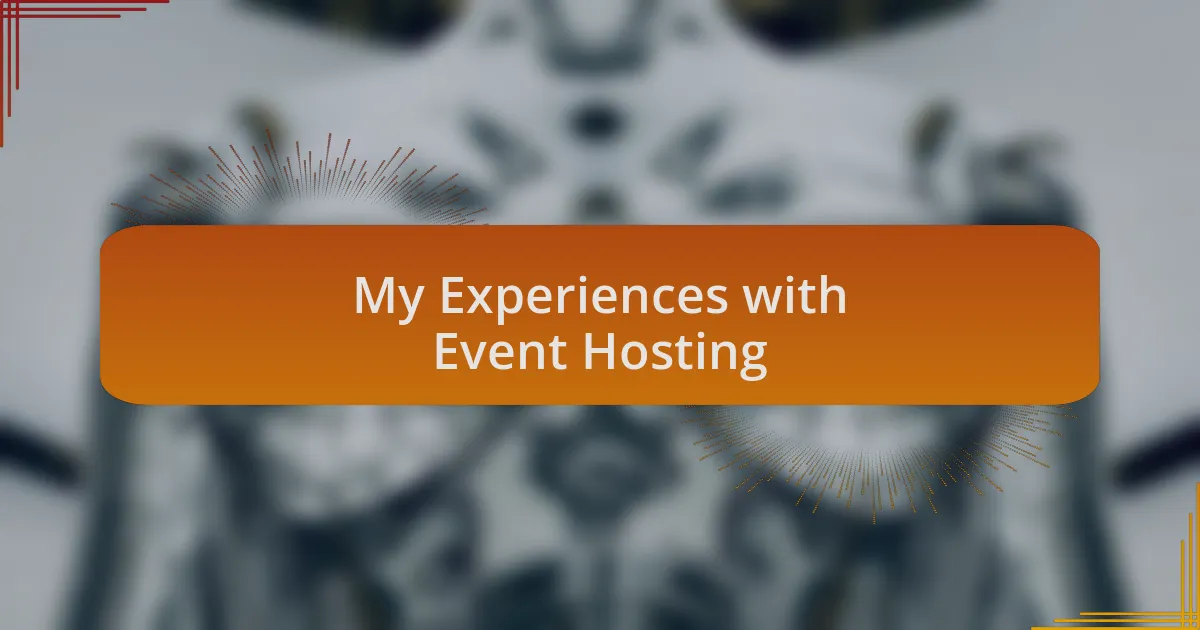
My Experiences with Event Hosting
Reflecting on my experiences with event hosting, I can’t help but think about the importance of adaptability. During a workshop I organized, we faced an unexpected rainstorm. Instead of letting it dampen our spirits, we quickly shifted activities indoors. I watched as participants embraced the change, and it reminded me how flexibility can turn potential disappointments into new opportunities for connection. Have you ever had to improvise in the moment? Those instances often lead to the most memorable moments.
Another memorable experience was the first community clean-up I hosted. I vividly recall the initial hesitations from some neighbors about getting involved. However, once we gathered, the energy shifted, and we bonded over shared laughter and stories while picking up trash. That day reinforced my belief in the power of community bonds—what began as a reluctant task transformed into an afternoon of shared purpose and connection. Isn’t it amazing how collective action can inspire camaraderie?
I also learned the value of promoting engagement through interactive elements. At a local art fair I coordinated, we included a collaborative mural project. Watching attendees from different backgrounds pick up a brush and leave their mark on the mural was an emotional experience for me. It not only beautified the space but also allowed each person to contribute to a collective masterpiece, showcasing the diverse talents of our community. How often do we get the chance to leave our legacy in such a tangible way?
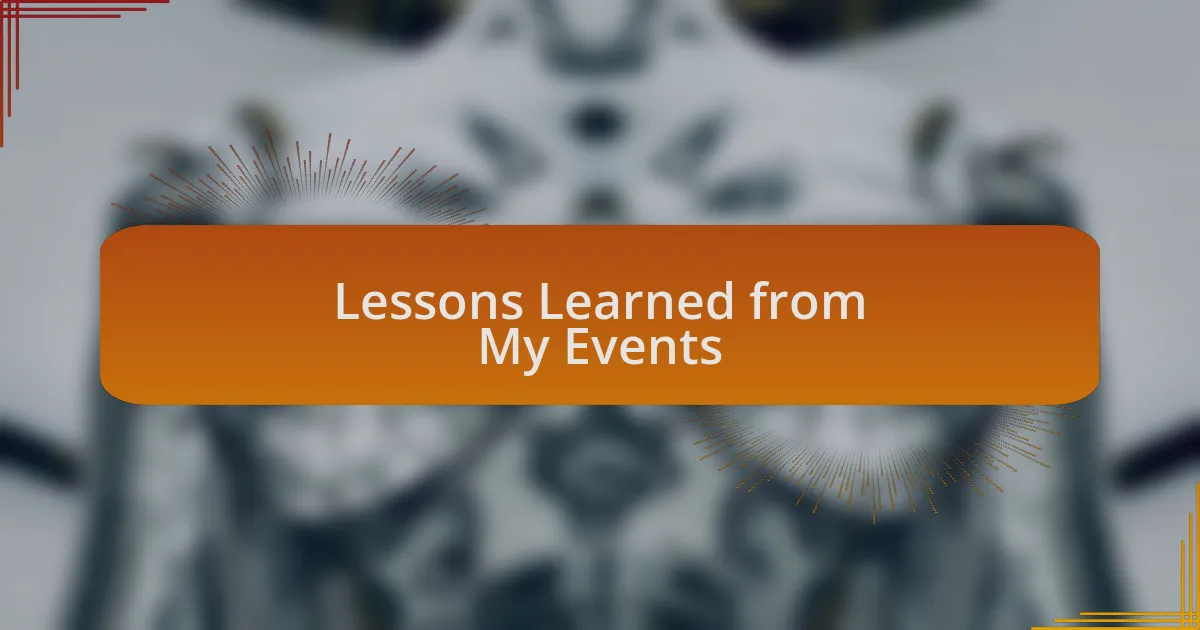
Lessons Learned from My Events
One key lesson I took away from hosting community events is the impact of fostering an inclusive environment. At a potluck dinner I organized, I encouraged everyone to bring a dish that represented their heritage. As each participant shared their story behind the dish, I felt an overwhelming sense of connection. Have you ever listened to someone’s personal story and felt a bond form? This experience highlighted how food can transcend barriers and create a sense of belonging.
Another important insight involves the necessity of clear communication. During a neighborhood workshop, I realized that not everyone understood the agenda initially. Instead of proceeding as planned, I took a few minutes to clarify what we would be covering. This minor adjustment made a significant difference; the participants were more engaged and responsive. Isn’t it interesting how a little clarity can spark enthusiasm?
Additionally, I’ve become acutely aware of the need for follow-up after events. After an open mic night, I reached out to participants to thank them and gather feedback. The responses were heartwarming and insightful, leading to a deeper understanding of their needs for future gatherings. How often do we miss opportunities for growth simply by not checking in? This reinforced my belief that engagement should continue even after the event is over, creating a lasting relationship rather than a one-time interaction.
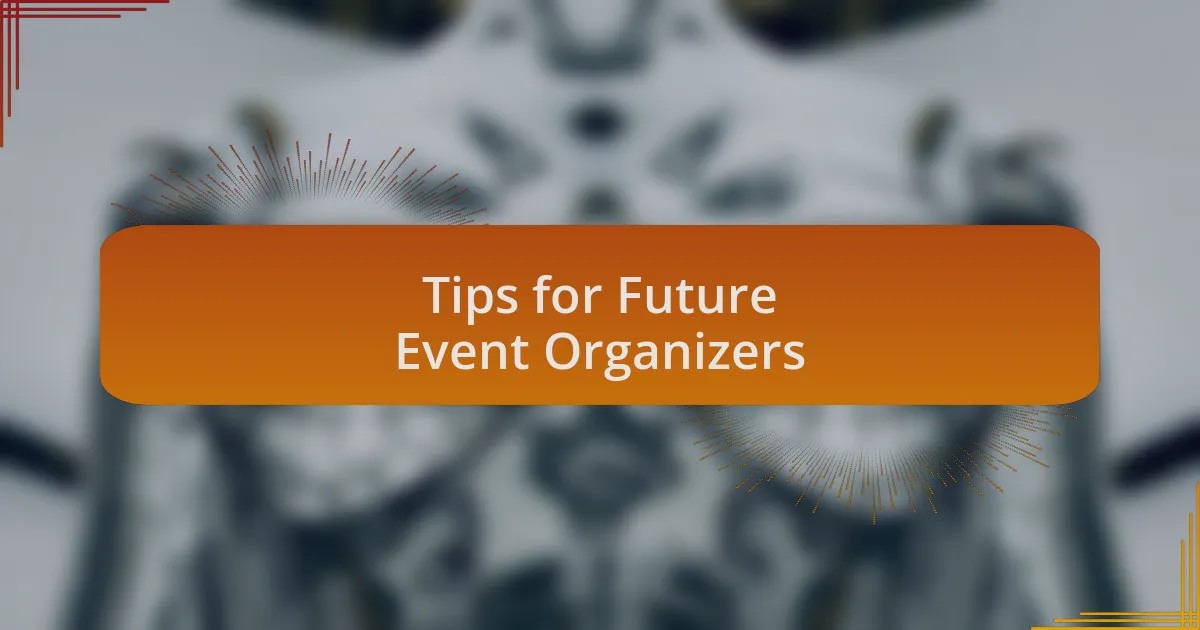
Tips for Future Event Organizers
When organizing your next community event, don’t underestimate the power of a well-structured timeline. I remember a local mural project that nearly fell apart due to a lack of a clear schedule. Participants were uncertain about their responsibilities and timing, which only led to confusion. Setting a timeline not only helps keep everyone on track but also builds a sense of accountability amongst the team. How reassuring is it when everyone knows what to expect?
Another vital tip is to embrace feedback throughout the planning process. I once ran a community garden initiative and involved attendees in discussions about what plants they wanted to grow. Their suggestions were invaluable; it made them feel invested in the project. Wouldn’t it be great if every decision made allowed participants to feel like they had a stake in the event? This collaborative approach not only enhances engagement but can lead to more successful outcomes.
Lastly, consider creating a welcoming atmosphere from the moment participants arrive. I hosted a book exchange once and made sure to greet every person at the door, engaging in light conversation. This simple action transformed the energy of the room and encouraged newcomers to mingle. Who doesn’t appreciate a warm welcome that sparks immediate connections? By prioritizing a friendly environment, you can pave the way for meaningful interactions and a memorable experience for everyone involved.